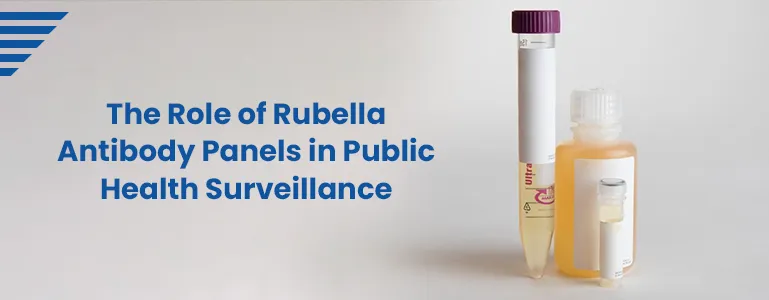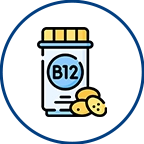The Role of Rubella Antibody Panels in Public Health Surveillance

Public health surveillance is a critical component of protecting communities from infectious diseases. One such disease is rubella, a contagious viral infection that can have serious consequences, especially for pregnant women and their babies. Rubella antibody panels play a pivotal role in public health surveillance efforts to monitor and control the spread of this virus. In this blog, we'll explore how rubella antibody panels contribute to public health surveillance and why they are essential in preventing outbreaks and protecting vulnerable populations.
Home Sample Collection
Understanding Rubella
Rubella, often referred to as the "German measles," is caused by the rubella virus. While it typically causes mild symptoms in children and adults, including fever and a rash, the real concern arises when pregnant women contract the virus. Rubella infection during pregnancy can lead to congenital rubella syndrome (CRS), which can result in severe birth defects in the developing fetus.
The Importance of Public Health Surveillance
Public health surveillance involves the systematic collection, analysis, interpretation, and dissemination of data on specific health conditions. Its primary goal is to identify trends, detect outbreaks early, and inform public health interventions. For rubella, surveillance is crucial for several reasons:
-
Early Detection of Cases: Surveillance systems help identify rubella cases promptly, allowing for timely intervention and isolation to prevent further spread.
-
Monitoring Vaccination Programs: Surveillance data can assess the effectiveness of rubella vaccination programs, ensuring that the population maintains adequate immunity levels.
-
Protecting Vulnerable Populations: Monitoring rubella cases is vital for protecting pregnant women and unborn children from the devastating effects of CRS.
The Role of Rubella Antibody Panels
Rubella antibody panels are a key tool in rubella surveillance. These panels involve serological testing to determine a person's immunity status to rubella. Here's how they work:
-
Blood Sample Collection: A small blood sample is taken from individuals, typically through a venipuncture.
-
Laboratory Testing: The blood sample is tested for the presence of rubella-specific antibodies, including IgG and IgM antibodies.
-
Interpreting Results: Based on the presence and levels of these antibodies, healthcare professionals can determine whether an individual is immune to rubella, recently infected, or susceptible to the virus.
The Contribution to Public Health Surveillance
Rubella antibody panels contribute to public health surveillance in several ways:
-
Identifying Immune and Susceptible Populations: Surveillance helps determine the proportion of the population that is immune to rubella and those at risk, guiding vaccination strategies.
-
Early Detection of Outbreaks: By monitoring rubella cases, authorities can detect outbreaks early, allowing for rapid containment measures.
-
Evaluating Vaccine Effectiveness: Surveillance data helps assess the effectiveness of rubella vaccination programs, ensuring that vaccination rates remain high.
-
Preventing CRS: Surveillance efforts protect pregnant women by preventing rubella infections and, consequently, congenital rubella syndrome.
Conclusion
Rubella antibody panels are invaluable tools in public health surveillance, playing a crucial role in preventing rubella outbreaks and protecting vulnerable populations. Their ability to assess immunity levels and identify recent infections aids in timely intervention and control measures. By ensuring that vaccination programs are effective and monitoring rubella cases, public health officials can work towards the goal of rubella elimination and the protection of maternal and child health. Public health surveillance remains an essential cornerstone in the fight against infectious diseases like rubella, promoting community well-being and safety.
Frequently Asked Questions
What is a Rubella antibody panel, and how does it differ from other Rubella tests?
A Rubella antibody panel is a combination of blood tests that assess a person's immunity to the Rubella virus. It provides a comprehensive view of Rubella immunity, differentiating between recent infections and past vaccinations.
Why is Rubella surveillance important for public health?
Rubella surveillance is essential for monitoring the prevalence of the virus in a population, identifying outbreaks, assessing vaccination program effectiveness, and protecting vulnerable groups, especially pregnant women and their unborn children, from Rubella-related complications.
Who typically undergoes Rubella antibody panel testing in public health surveillance efforts?
Individuals selected for Rubella antibody panel testing may include pregnant women, healthcare workers, childcare providers, and individuals planning to travel to regions with Rubella outbreaks. It can also be part of routine screening in some populations.
How does Rubella surveillance contribute to the prevention of congenital rubella syndrome (CRS)?
Rubella surveillance helps identify and contain Rubella outbreaks promptly, reducing the risk of Rubella infection in pregnant women. By protecting pregnant women from Rubella, CRS can be prevented.
Can Rubella antibody panels determine if a recent Rubella infection has occurred in a community or region?
Yes, Rubella antibody panels can identify recent infections by detecting the presence of Rubella-specific IgM antibodies, which indicate acute Rubella infection.
Are Rubella antibody panels reliable for assessing vaccine coverage and effectiveness?
Yes, Rubella antibody panels are used to evaluate the immunity of populations and assess the effectiveness of Rubella vaccination programs. They help determine if vaccination coverage rates are sufficient to maintain herd immunity.
How often should Rubella antibody panels be conducted as part of public health surveillance?
Book Appointment
Our Locations Near You in Hyderabad
3KM from Banjara Hills
1.9KM from Yusufguda
3KM from Madhura Nagar
5KM from Shaikpet




